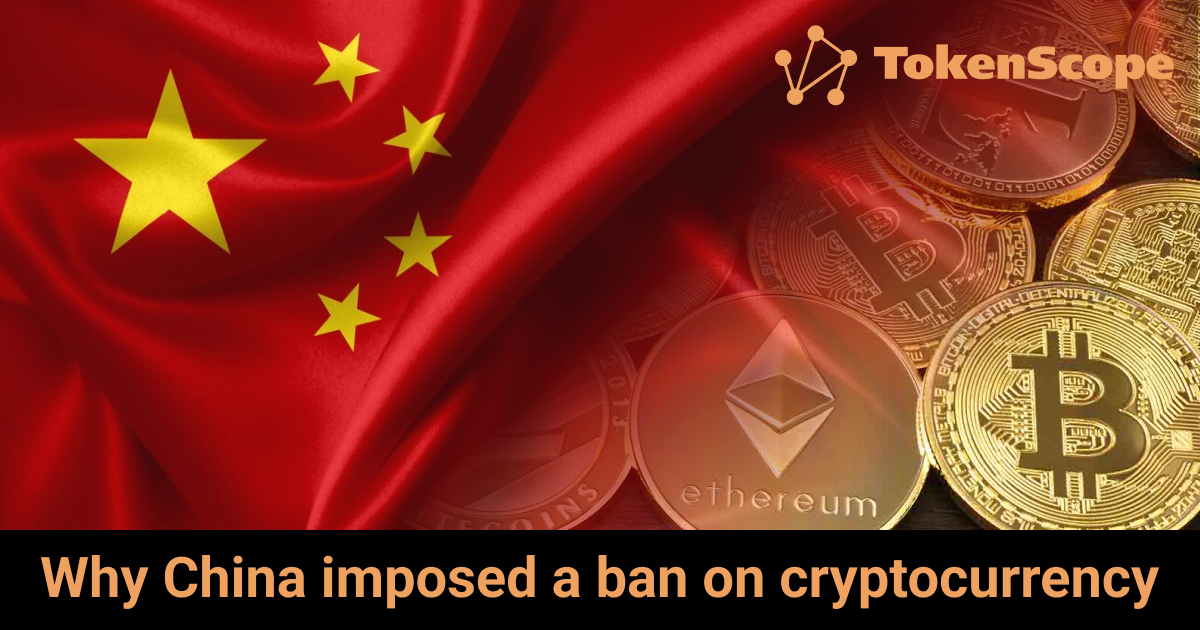Why China imposed a ban on cryptocurrency

At the end of 2021, the People's Bank of China (PBOC) banned all cryptocurrency transactions. The regulator cited the role of cryptocurrencies in facilitating financial crimes and that they pose a growing risk to China's financial system due to their highly speculative nature.
Some experts also believe that a possible reason for these measure was an attempt to combat the outflow of capital from the country. China has set a $50,000 annual cap on foreign currency purchases as part of its already strict capital controls. Thus, the cryptocurrency could become one of the ways for the flight of capital from the country, bypassing the restrictions imposed on traditional finances.
Thanks to cryptocurrencies, Chinese people have been able to acquire foreign assets without being controlled by the Chinese authorities. Given the decentralized nature of Bitcoin and many other cryptocurrencies, the people of the country began to actively use them to bypass the regulator's control over capital.
Nevertheless, despite the tightening of controls, the Chinese authorities continue to fear the outflow of capital from the country. Back in 2017, the People’s Bank of China banned the exchange of cryptocurrencies for fiat money, apparently due to the fact that most of the outflow of capital from China was provided by the use of stablecoin Tether (USDT), which is pegged to the value of the US dollar.
Tether's popularity rose in 2017 after the PBOC imposed restrictions on cryptocurrency exchanges in China. Trading bitcoin for Tether was also made illegal due to the PBOC ban on cryptocurrency exchanges in 2017, but Chinese cryptocurrency traders were still able to acquire Tether by shadow trading with OTC brokers or using foreign bank accounts.
Thus, perhaps there was another reason why the Chinese authorities decided to ban cryptocurrency in the country. It may be connected with the cointry’s uncompromising fight against corruption. The ability to use cryptocurrency for corrupt purposes and transfer it to other countries bypassing PBOC control could hardly please the Chinese authorities.
China has been pursuing a policy of «zero tolerance in the fight against corruption» for many years. The strategic goal of the country in the fight against corruption consists of three postulates, according to which country’s officials
- do not dare to commit corrupt acts;
- have no possibility to commit corrupt acts;
- don’t want to commit corrupt acts.
With regard to the possible use of cryptocurrencies for corruption purposes, China also has a tough stance. In recent years, quite large investigations into corruption crimes have been carried out in the country.
During these investigations, it was found that many corrupt officials were withdrawing money to foreign countries using cryptocurrencies. In fact, Bitcoin or Tether has become a money laundering tool, a mechanism that, due to its anonymity, was perfect for bribery.
Prior to the total ban on cryptocurrencies and mining in 2021, Chineese watchdogs made attempts to deanonymize transactions in cryptocurrencies. Thus, cryptocurrency exchanges in China were required to comply with Anti-Money Laundering requirements and implement mandatory KYC procedures, as well as cooperate with the PBOC and law enforcement authorities in anti-money laundering investigations.
But, apparently, these measures did not bring the desired result. China, which stood on a second place in the world in cryptocurrency mining, has banned all cryptocurrency transactions since September 2021.
In addition, foreign crypto exchanges and other financial companies cannot provide services related to cryptocurrencies to Chinese residents. For violation of the law, criminal liability is threatened: a fine (from 7,900 to 79,000 USD, depending on the severity of the crime), as well as imprisonment.
If in addition to illegal actions with cryptocurrencies, we are talking about the commission of corrupt acts by an official, then, most likely, these types of punishment will be imposed in conjunction with measures of responsibility for committing corrupt acts. In China, liability for corruption offenses, depending on the severity of the act, may vary from disciplinary sanctions up to criminal punishment in the form of imprisonment and the death penalty.
In one case the Vice Chairman of Jiangxi Province was dismissed from all government positions and sent to court for assisting mining companies in their activities. The official is accused of violating party discipline and violating the ban on any operations using cryptocurrency tools. Separately, it was noted that since he was a civil servant, in addition to confiscation of property, by a court decision, capital punishment in the form of the death penalty may be possible.
To monitor illegal transactions in cryptocurrency and identify corrupt officials, China is actively developing and applying new technologies. For example, in 2012, China launched the AI-based Zero Trust system, which was specifically created to combat corruption among officials in the country.
AI gathered information from 150 government databases and analyzed social relations among government employees, identified similarities and differences in people's behavior, helped to calculate the illegal transfer of property or suspicious acquisitions of Chinese officials. If the program had some suspicions, it calculated the percentage of the probability of corrupt activity. As soon as this percentage exceeded the set bar, the system sent a notification to the authorities.
Thus, the experience of China serves as an example of rather tough (due to strict criminal sanctions) actions to combat corruption violations, including those related to cryptocurrencies.
However, even China is not able to stay away from the development of the multibillion-dollar cryptocurrency industry. We already wrote that the Hong Kong’s authorities intend to legalize retail transactions with cryptocurrencies, other digital assets, and exchange-traded investment funds working with cryptocurrencies.
At the same time, the Hong Kong Securities and Futures Commission (SFC) for the first time introduced the criteria for obtaining a license for exchange-traded investment funds working with cryptocurrency ETFs. At the first stage, they will be able to invest in bitcoin and ether futures, and in the future the list of available instruments will be expanded.
This is probably due to the fact that most cryptocurrency businesses that were previously registered in China did not shut down operations, but moved to offshore jurisdictions or Singapore. Now Chinese government might want to return part of the lost profit.
The TokenScope Team will continue to monitor the development of cryptocurrency regulation in China, as well as the most important changes in world's crypto regulation and provide a comprehensive and prompt overview.




